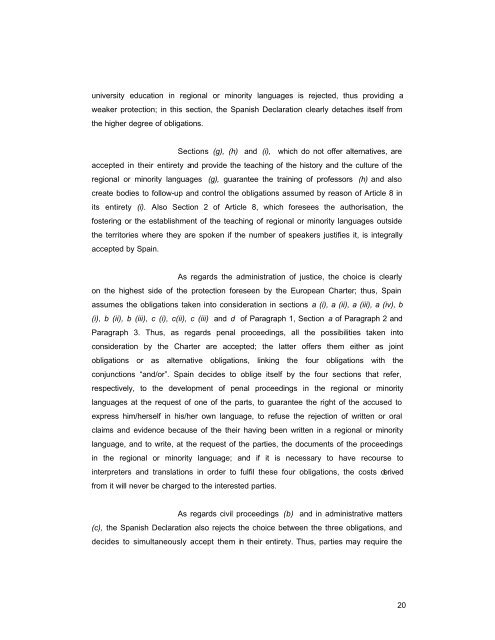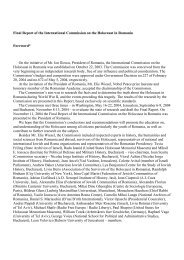get PDF document - MIRIS
get PDF document - MIRIS
get PDF document - MIRIS
Create successful ePaper yourself
Turn your PDF publications into a flip-book with our unique Google optimized e-Paper software.
university education in regional or minority languages is rejected, thus providing a<br />
weaker protection; in this section, the Spanish Declaration clearly detaches itself from<br />
the higher degree of obligations.<br />
Sections (g), (h) and (i), which do not offer alternatives, are<br />
accepted in their entirety and provide the teaching of the history and the culture of the<br />
regional or minority languages (g), guarantee the training of professors (h) and also<br />
create bodies to follow-up and control the obligations assumed by reason of Article 8 in<br />
its entirety (i). Also Section 2 of Article 8, which foresees the authorisation, the<br />
fostering or the establishment of the teaching of regional or minority languages outside<br />
the territories where they are spoken if the number of speakers justifies it, is integrally<br />
accepted by Spain.<br />
As regards the administration of justice, the choice is clearly<br />
on the highest side of the protection foreseen by the European Charter; thus, Spain<br />
assumes the obligations taken into consideration in sections a (i), a (ii), a (iii), a (iv), b<br />
(i), b (ii), b (iii), c (i), c(ii), c (iii) and d of Paragraph 1, Section a of Paragraph 2 and<br />
Paragraph 3. Thus, as regards penal proceedings, all the possibilities taken into<br />
consideration by the Charter are accepted; the latter offers them either as joint<br />
obligations or as alternative obligations, linking the four obligations with the<br />
conjunctions “and/or”. Spain decides to oblige itself by the four sections that refer,<br />
respectively, to the development of penal proceedings in the regional or minority<br />
languages at the request of one of the parts, to guarantee the right of the accused to<br />
express him/herself in his/her own language, to refuse the rejection of written or oral<br />
claims and evidence because of the their having been written in a regional or minority<br />
language, and to write, at the request of the parties, the <strong>document</strong>s of the proceedings<br />
in the regional or minority language; and if it is necessary to have recourse to<br />
interpreters and translations in order to fulfil these four obligations, the costs derived<br />
from it will never be charged to the interested parties.<br />
As regards civil proceedings (b) and in administrative matters<br />
(c), the Spanish Declaration also rejects the choice between the three obligations, and<br />
decides to simultaneously accept them in their entirety. Thus, parties may require the<br />
20












